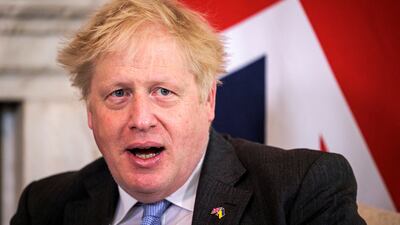UK Prime Minister Boris Johnson came under fire on Monday for not using the Queen’s Speech to promise more action to combat rising living costs, saying the government cannot “completely shield” people from it.
Instead the prime minister laid out plans for a “high-wage, high-skill” economy, saying the government was working to “build the foundations for decades of prosperity”.
However, Mr Johnson’s failure to outline short-term measures to lessen the financial burden on people’s day-to-day lives was criticised by charities, campaigners and opposition politicians.
The prime minister hinted at future help, using the “fiscal firepower” of the government.
“We will continue to use all our ingenuity and compassion for as long as it takes,” he told MPs.
“The chancellor and I will be saying more about this in the days to come.”
But any extra intervention to help with the current strain on household budgets will not be arriving in the next few days, a Downing Street source told the PA news agency.
The Treasury, asked about the prime minister’s comments, pointed to the chancellor, saying on Monday that there would be “better clarity on what energy prices will be in the autumn”.
Speaking in the Commons, Mr Johnson went on to say there are limits to how much public money he was prepared to commit to addressing a global economic crisis.

With the war in Ukraine raging, the government’s programme included a series of measures to give the security services extra powers to tackle foreign spies and efforts to influence British democracy.
The package also contains measures aimed at taking advantage of the freedoms offered by Brexit — but there was no legislation to enact the government’s threat to tear up the deal on Northern Ireland’s trading arrangements, although officials said that remained an option.
But with rising energy bills, inflation forecast to hit 10 per cent and benefits and wages failing to keep up with the increase in prices, the cost of living is set to dominate domestic politics in the coming months.
The government highlighted the £22 billion ($27bn) package of help with energy bills, tax cuts and other measures already announced, but its focus is on generating economic growth to help address the issues rather than increasing state support, with public finances already battered by the billions borrowed to address the pandemic.
“After two years of Covid-19, I know that the last thing people need are further challenges,” Mr Johnson said.
“I know people are struggling with their bills and that they are anxious about the future.
“While we must keep our public finances on a sustainable footing — and we cannot completely shield people from the fallout from global events — where we can help, we will.”
Mr Johnson said the “aftershocks of Covid-19 and the biggest war in Europe since 1945” are causing disruption around the world, with all major economies facing cost-of-living pressures.
“It is right that we continue doing whatever we can to ease the burdens people are grappling with now, supporting the hardest-hit with £22bn of help to address the cost of living and cutting hundreds of pounds off household bills.
“But we must also remember that for every pound of taxpayers’ money we spend on reducing bills now, it is a pound we are not investing in bringing down bills and prices over the longer term.”

He said the government’s “top priorities” are growing the economy, making streets safe and supporting the NHS to clear the backlogs built up during the pandemic.
Labour leader Sir Keir Starmer called the response to the situation “pathetic”, telling Mr Johnson: “This government’s failure to grow the economy over a decade, combined with its inertia in the face of spiralling bills, means that we are staring down the barrel of something we haven’t seen in decades — a stagflation crisis.”
Liberal Democrat leader Sir Ed Davey said the Queen’s Speech “does nothing to help the millions of families and pensioners facing soaring bills and eye-watering inflation”.
“This speech was a far cry from what struggling families needed to hear today”, offering “no short-term comfort for parents struggling to feed their kids in the face of rocketing prices”, said Child Poverty Action Group chief executive Alison Garnham.
Dan Paskins, director of UK impact at Save the Children added that “the Queen’s Speech was a major opportunity to support those most affected by rising costs and the government didn’t take it”.
And Confederation of British Industry’s Matthew Fell said “firms looking for the government to address the cost-of-living crisis by growing the economy will be encouraged by the ambition in the Queen’s Speech”.


